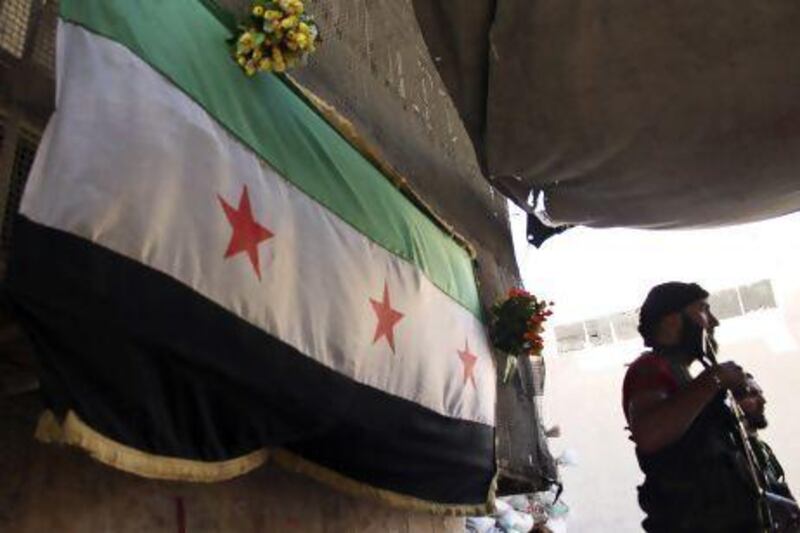Gaziantep, Turkey // Syria's main political opposition alliance will not take part in a proposed international peace conference in Geneva until Hizbollah militants withdraw from the Syrian conflict.
Both the Syrian regime and opposition Syrian National Coalition are being prodded by their respective international backers to take part in the talks.
But the SNC said yesterday it would not consider taking part in Geneva 2 unless Hizbollah fighters and Iranian military personnel, fighting on behalf of Bashar Al Assad's regime, be pulled out of the battle for Qusayr and other parts of the country.
"The National Coalition will not take part in any international conference or any such efforts so long as the militias of Iran and Hizbollah continue their invasion of Syria," George Sabra, the SNC's acting president, said in Istanbul.
"Today, Syrians' lives are more important than any political solution or any international conference," Mr Sabra said.
Syria's president yesterday reiterated his regime's willingness to attend the peace talks "in principle", but said any deal struck would have to be approved by referendum.
"The only condition is that anything to be implemented will be submitted to Syrian public opinion and a Syrian referendum," Mr Al Assad told Lebanon's Al Manar television channel in an interview broadcast last night.
The Syrian opposition's call for a withdrawal of foreign fighters comes as outgunned, outnumbered rebels hold on against a massive regime assault in Qusayr. Hizbollah fighters have played a decisive role in the battle, with the French government estimating that up to 4,000 of the Shiite guerrillas are inside Syria.
Hizbollah, which follows Iran's supreme leader Ali Khamenei - a key backer of Mr Al Assad - is part of the Lebanese coalition government but maintains a powerful private army, which it long insisted was in place to defend Lebanon and fight Israel.
Now, however, it is embroiled in the Syria war, fighting alongside regime troops. The rebels it is facing are mainly Sunni Islamists, adding to sharply increased sectarian tensions in the region.
The SNC's announcement yesterday came on the eighth day of a deadlocked general meeting in the Turkish capital - extended from three days - and after intervention by the Turkish foreign minister Ahmet Davutoglu, as well as Saudi and Qatari officials, pushing for an expansion of SNC membership and an agreement to attend Geneva 2.
A senior SNC member said there had been intensive outside pressure to take part in the talks.
"Everyone we meet, every time we shake hands they tell us, 'you are going to Geneva, aren't you'," the official said.
But the SNC has also been under pressure from some Syrian activists - whose support it can ill afford to lose - not to attend.
"If the SNC says it will go to Geneva they will hear some strong words from influential activist groups inside Syria," said one opposition campaigner in Damascus.
He called the proposed negotiations, which are being orchestrated by the US and Russia as a way of seeking a peaceful settlement in Syria, a waste of time because the regime would never compromise and western states will not increase their assistance to rebels whatever the outcome of the talks.
The SNC has been demanding that Mr Al Assad step down, but Syria's foreign minister, Walid Moallem, said on Wednesday that the Syrian president would stay on until at least 2014 and might seek a third seven-year presidential term.
The Assad family has ruled Syria, an authoritarian police state, since 1970, forcefully crushing any challenge to its power.
Yesterday the SNC, brought the brink of collapse by fractious infighting this week, was considering new demands by the rebel Free Syrian Army that it be given a major block of seats in the coalition.
That demand, prompted by the SNC's very public disarray, looks likely to scupper an impending deal between Islamists and moderates, headed by dissident writer Michael Kilo, for an expanded alliance.
The FSA is ostensibly the military wing of the SNC but this new demand for direct representation in political affairs underlines a spreading lack of faith in the SNC's competence among opposition and rebel factions.
In the first document the SNC has released since the meeting began, it said deciding on expanding the coalition democratically "takes time", but gave no details on what shape that expansion might take.
psands@thenational.ae
twitter: For breaking news from the Gulf, the Middle East and around the globe follow The National World. Follow us
Syrian National Coalition says no peace talks until Hizbollah and Iran withdraw
SNC says it will not consider taking part in Geneva 2 unless Hizbollah fighters and Iranian military personnel, fighting on behalf of Bashar Al Assad's regime, are pulled out of the battle for Qusayr and other parts of the country. Phil Sands reports

Editor's picks
More from the national




